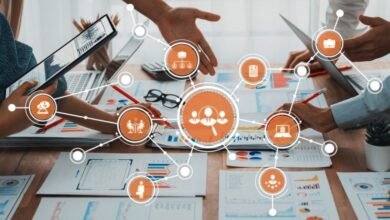Essential Digital Transformation Trends For 2025
If the process of business evolution is a luxury car, then digital transformation is the engine driving the change. Think of any big brand, like Amazon, Domino’s Pizza, Nike, Netflix, and many others. The one common thing in all their stories is how everything worked for them when they took their business digital.
The brands are redefining the way one can use digitalization in their businesses, and we have taken notes for you. In this article, we’ll dive into the top digital transformation trends that are set to dominate the business world in 2025 and beyond. Whether you’re a start-up, an established enterprise, or a tech enthusiast, these trends are essential for understanding the future of business.
Digital Transformation In 2025: Trends To Watch Out For
AI-Powered Automation
Artificial Intelligence (AI) continues to revolutionize industries by automating routine tasks and providing advanced insights that were once unimaginable, streamlining everything from customer service to supply chain management. AI in customer service is evolving from simple chatbots to more complex systems capable of providing personalized interactions. Imagine an AI agent that doesn’t just answer questions, but can anticipate customer needs, predict their future behavior, and provide tailored recommendations. This level of service can be achieved through advanced Machine Learning algorithms and Natural Language Processing (NLP).
AI in operations is automating business processes like inventory management, predictive maintenance, and financial forecasting. Businesses are using AI to optimize their supply chains, anticipate disruptions, and forecast demand more accurately than ever before. This leads to faster decision-making, lower operational costs, and improved customer satisfaction.
The Rise Of Low-Code And No-Code Platforms
In the past, developing software or creating business solutions required a team of skilled developers. But with the rise of low-code and no-code platforms, organizations can now create and deploy custom applications without writing a single line of code. These platforms are opening up new possibilities for nontechnical employees, allowing them to build tools that fit their specific needs.
By 2025, low-code/no-code development is expected to become even more widespread. The ability for businesses to quickly build and launch apps without relying on IT departments will drastically improve time-to-market for products and services. These platforms empower departments like marketing, HR, and operations to create automated workflows, dashboards, and data integrations with minimal technical expertise.
This trend is making software development more inclusive, enabling companies to harness the creativity and expertise of a broader range of employees. It’s no longer just about tech teams, it’s about the entire organization being able to innovate.
5G Connectivity
5G is more than just a faster internet connection; it’s a game changer for businesses. As 5G networks expand globally in 2025, they will provide the high-speed, low-latency connectivity required for innovative technologies like Internet of Things (IoT), autonomous vehicles, and real-time data processing.
For businesses, 5G will enhance remote work capabilities, enabling smoother virtual meetings and more efficient cloud-based applications. It will also support the increased use of IoT devices, which rely on fast, reliable data transmission to function properly. From smart factories to connected retail experiences, 5G is expected to unlock new levels of operational efficiency, innovation, and customer engagement.
In retail, 5G will enable Augmented Reality (AR) and Virtual Reality (VR) shopping experiences to become more immersive, where customers can try products virtually with zero latency. For industries like manufacturing, 5G will enable real-time monitoring and predictive maintenance, allowing businesses to keep operations running smoothly and reduce downtime.
Cybersecurity
As businesses continue to digitize their operations, cybersecurity remains a critical concern. In 2025, organizations will be focusing more on integrating security directly into their digital transformation processes. The rise in cyber threats, such as ransomware and data breach, means that protecting sensitive information is nonnegotiable.
The trend towards zero-trust security, which assumes that every user, device, and network is potentially compromised, will become a standard practice. Instead of relying on perimeter-based security, businesses are moving towards continuously verifying identity and access permissions. This approach ensures that even if an attacker gains access to the network, they won’t be able to move freely.
In addition, AI-driven security solutions will become more common. These tools can detect unusual patterns of behavior, identify potential threats in real time, and respond faster than human teams. With these advanced capabilities, businesses can significantly reduce the risk of cyber attacks while maintaining the trust of their customers.
Cloud Migration And Hybrid Cloud Solutions
The cloud has become an essential part of the digital transformation journey, and in 2025, cloud migration is accelerating as organizations continue to move their data, applications, and workloads to the cloud. However, businesses are no longer simply moving everything to one cloud provider. The shift towards hybrid cloud solutions is becoming the norm.
With hybrid cloud, companies can store some data and applications on public clouds for scalability and flexibility while maintaining more sensitive workloads on private clouds for enhanced security. This allows organizations to benefit from the best of both worlds: the agility and cost-effectiveness of public clouds combined with the security and control of private clouds.
Moreover, multi-cloud strategies are gaining popularity, as businesses look to avoid dependency on a single provider and ensure redundancy in case of outages. As cloud technology continues to evolve, 2025 will see more organizations adopting cloud-native development models, leveraging cloud infrastructure for advanced analytics, and creating more resilient and scalable systems.
The Integration of IoT And Data Analytics
The Internet of Things is about data, insights, and decision-making. In upcoming years, IoT will continue playing a crucial role in transforming industries such as manufacturing, healthcare, logistics, and agriculture. By connecting devices, sensors, and machines to the internet, businesses can collect vast amounts of data that can be analyzed in real time to optimize operations.
IoT and data analytics are working hand-in-hand to provide businesses with deeper insights. In manufacturing, for example, IoT sensors on machinery can monitor performance and predict when equipment will need maintenance, reducing downtime and improving productivity. In retail, IoT can track customer behavior in stores, providing valuable insights that allow businesses to personalize marketing efforts and optimize the shopping experience.
With the explosion of IoT devices, the need for advanced analytics platforms that can process and make sense of the data they generate has never been greater. In 2025, businesses will rely on AI-powered data analytics to turn the massive amounts of IoT-generated data into actionable insights that drive business growth.
Embrace The Future, Now
The trends outlined above illustrate just how integral technology is to every aspect of business, from AI and automation to cloud migration and sustainability efforts. As businesses continue to adopt these innovations, they will unlock new opportunities for growth, efficiency, and resilience.
For companies to stay ahead of the curve, it’s essential to not only understand these trends but to actively embrace them. The businesses that lead the way in digital transformation will be the ones that adapt quickly, leverage cutting-edge technologies, and prioritize customer and employee experiences. The future is digital. And the time to transform is now.
Source link





